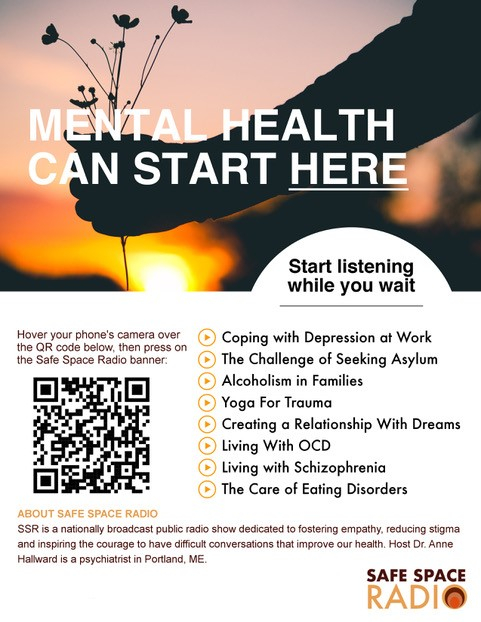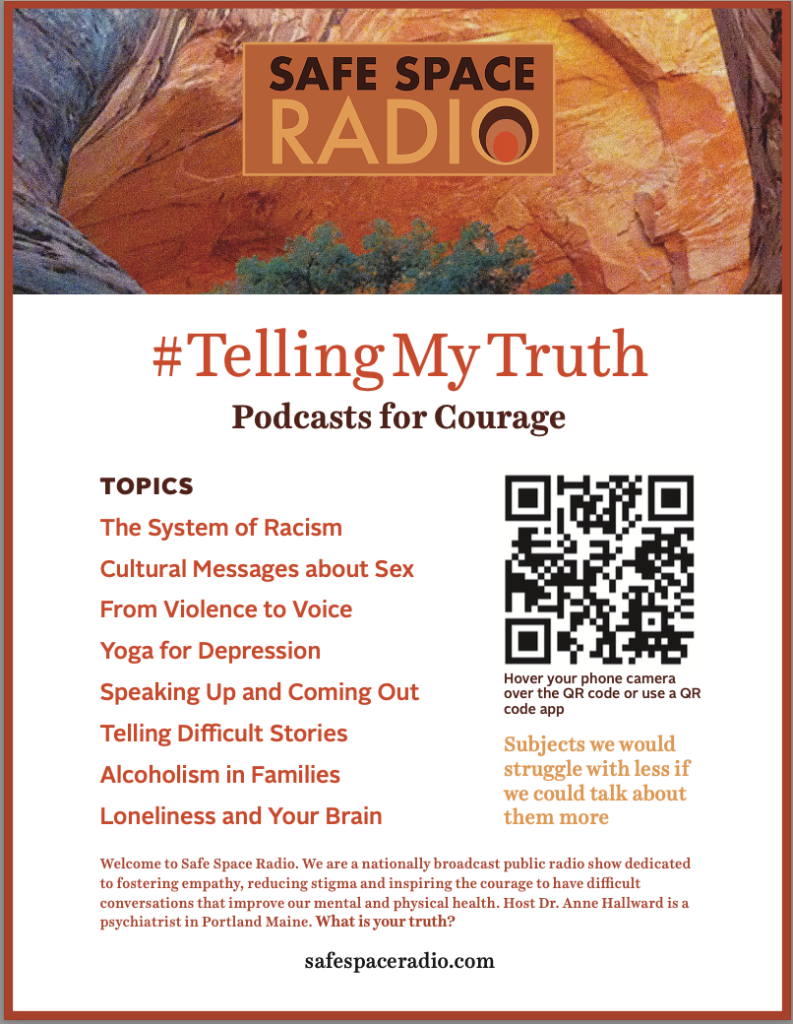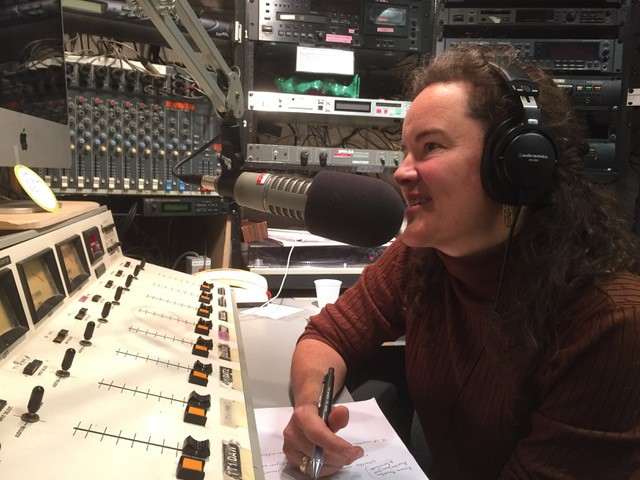Libraries, the Centerpiece of a Public Health Initiative
Libraries are increasingly playing an essential role in our communities as a hub for access to information, support, and opportunity. Because of this, Safe Space Radio has made libraries the cornerstone of an ongoing public health initiative. Developed in response to an escalating mental health crisis impacting individuals of all ages and in all sectors of society, Safe Space Radio designed an outreach campaign offering free mental health resources via podcasts.
The Safe Space Radio Public Health Initiative was launched in the fall of 2021. The tent cards on which a QR code links to a curated podcast playlist are currently being carried in approximately forty public libraries across the country, as well as in numerous book stores, coffee shops, and other gathering places Figure 1). For many, obtaining free and affordable mental health resources is very difficult. The podcasts Safe Space Radio offers are intended to help listeners feel understood, hopeful, and less alone, while also serving to destigmatize emotions and issues that are often shrouded in shame.
Figure 1. 5″ x 7″ tent card displayed in libraries across the country.

The core mission of Safe Space Radio, a nonprofit founded in 2008 by Maine-based psychiatrist and national radio host Dr. Anne Hallward (Figure 2), is to “inspire courageous conversations, reduce stigma, shame and isolation, and foster compassion and public health.” In her private practice, Dr. Hallward discovered that feelings of shame were the deepest source of suffering whether her patients were struggling with depression, anxiety, addiction, trauma, or suicide. This was not something that had been addressed during her Harvard Medical School training. She was compelled to bring this awareness to a larger audience in a relatable, easy-to-access format. As Dr. Hallward says, “I felt like I had stumbled on a public health emergency that needed a public health solution. What I noticed is that when my patients spoke about shame, they often looked away or covered their face, so it suddenly occurred to me that radio was the perfect medium, because the guest is not being visually scrutinized, and the listener can explore stigmatized subjects in privacy.”
Figure 2. Dr. Anne Hallward in the sound studio conducting a Safe Space Radio interview.
With an archive of 300+ podcasts featuring the personal experiences of courageous storytellers, as well as professionals and researchers, Safe Space Radio seeks to encourage conversations about topics that “we’d struggle with less if we talked about them more.” Based on Anne’s experience as a therapist, she knew that breaking silence about stigmatized subjects like mental health, sexuality, death and dying, and climate fears can benefit both the storyteller and the listener. Stories in which vulnerability is shared can inspire courage, self-knowledge, and advocacy, while reducing loneliness and isolation.
Safe Space Radio has been undeterred in the work of bringing up uncomfortable issues for discussion. Her timeless podcast Talking to White Kids about Racism, produced in 2019, has been one of the most popular and sought after recordings in the library and on NPR. Climate Courage, which discusses turning fear-based paralysis and anxiety into advocacy and action, becomes more relevant daily.
Libraries are offered two playlists, accessed by a QR code printed on colorful tent cards for display on reading tables and in workstations (Figure 3). The original playlist, “Mental Health Can Start Here,” is designed to tackle mental health issues and is primarily curated for adults. The eight podcasts feature topics such as Alcoholism in the Family, Coping with Depression at Work, and Psychiatric Care of Eating Disorders. The other playlist, “Telling My Truth, Podcasts for Courage,” was created based on input from a series of focus groups with young adults. It is designed to stir the bravery needed to discuss mental health needs and concerns. It includes podcasts such as Yoga for Depression, Loneliness and Your Brain, and Cultural Messages About Sex.
Figure 3. Another of the tent cards displayed in participating libraries across the country.

In addition to the diverse range of issues explored in the podcasts, available free of charge to the general public, Safe Space Radio has developed a series of educational programming available to students at no charge. For medical professionals, ten accredited podcasts are available for continuing medical education credits. Additionally, soon to be featured on Safe Space Radio’s website are the recordings of lectures given by Dr. Hallward, as well as several colleagues, for a twelve-part series designed to support 171 recently escaped Afghan women enrolled in the Asian University for Women in Bangladesh.
For access to Safe Space Radio’s library of podcasts, go to www.safespaceradio.com. For questions, or to order the library public health initiative materials for your institution, please send an email to annehallwardSSR@gmail.com.


